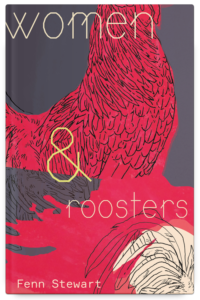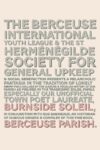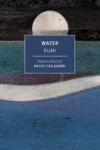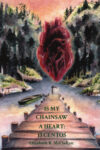
The title of Fenn Stewart’s book-length poem women & roosters comes from the ancient Greek physician Aelius Galenus, who said that “all creatures are sad after sex except women and roosters.” As epigraph to the collection, this aphorism seems both totally arbitrary and in some intangible way, kind of true. It has the same bold and dubious line as any sweeping proclamation about gender and sex, but also seems to suggest a kind of mytho-logic we may not have access to as contemporary readers of Galenus. At first, it’s roosters that seem out of place: what could the sex life of a male bird famous for its stupidity have in common with that of human women? What does it even mean to say that a bird isn’t sad in the same way a woman isn’t sad, and how do we know that he’s not? But then you picture a rooster after sex. You picture a rooster at all, you remember that his only form of movement is the strut. You see him marching around like a totem of dumb masculine sexuality cut off from the heart and the brain, and you understand that roosters are not sad after sex. Now, it’s the women that seem mysterious. It turns out Galenus’ maxim is false, at least in the world of Stewart’s poem, but it’s also not arbitrary. Good poetry is never arbitrary; it’s active and intentional, like an argument.
With a PhD in social and political thought, Stewart has written poetry about “nature” as a sociopolitical concept that is as aesthetically vast as it is problematic. Her body of work includes three chapbooks and the collection Better Nature, which adapts language from the diary of Walt Whitman alongside a mix of ephemeral documents speaking to “wilderness” as an idea deeply entangled with Canada’s legacy of colonization. In women & roosters, Stewart turns her attention to a failed relationship, chronic illness, the forests of her childhood, and Dungeness crabs. Her book is not straightforwardly “about sex,” but it’s about “after sex” as an expansive state that follows a breakup, although Stewart makes the word “breakup” seem glib, and directionally wrong. She figures the loss of a lover as a contraction, a shrinking of self and experience. She talks about getting “pressed down, over time, / worn out—I mean, I have, I am.” Faced with the possibility that she may not, in fact, be exempt from the sadness, she says, “but I’ll become my length in time (I’ve done it before, I can / prob’ly do it again) / I’ll stretch out to my full length, I’ll press myself against a / wall.” As a reader, you get the sense that if loss presses you down, the act of writing a quasi-epistolary poem about it is the wall that stretches you back out again.
Much of the poem is addressed to a “you” who is both hyper-present and understood to be not listening. Stewart works in a register both conversational and vulnerable, bound by neither grammatical nor social conventions. “I’m writing to stop myself from writing you,” she writes, rendering this poem less of a letter and more of a soliloquy. It’s fitting, then, that Stewart keeps coming back to Shakespeare. She imagines herself as Olivia from A Winter’s Tale, “[sending] Malvolio after you with a ring” and names the air as being “like Macbeth, but thick with atmospheric river, not with regicide.” Anyone familiar with Shakespearian romance will tell you that it is largely about working through miscommunication, and these allusions do similar work here. Stewart draws out the twinge of uncertainty that follows intimacy—the need to know whether that word or gesture meant what you thought it meant, if there was anything you could’ve done to make it mean something else—into a richly textured emotional landscape. Alongside and often merged into scenes of joy and pain in the natural world, the speaker and her beloved negotiate their ability to “talk about it.” The most arresting of these scenes comes just after they’ve discovered a snake (“a genius! The genius of the place! we said and were so happy”):
Driving back on the Malahat, with the sun coming in and burning my left arm, and you beside me, passenger seat way back, relaxing, which made me mad because why do I always have to be the one to drive, and burn my arm, and not lie back and relax? And you said, “If there’s ever something we can’t talk about,” and I interrupted: “Something catastrophic?”
You shrugged. You looked out through your shady window at the rocky walls the government had blasted through to make the highway, and you shrugged. “Something simple,” you said.
(Well, I think you shrugged. Maybe you’ll read this and you’ll say you didn’t shrug. But you did, and the lizard in my brain flinched.)
“Something simple,” you said.
But I heard catastrophic. I heard something small, and catastrophic.
Something pointy, sharp, and catastrophic.
Dialogue is the life force of this poem. When it falters, relationships unravel, and invasive species take over the forest. As the book progresses, this fixation on (mis)understanding evolves into an exploration of etymology and definition as ways of coping with loss and disorder, both as it relates to erotic withdrawal and the natural world. A prose-like section beginning with “quiet ducks and loud bullfrogs and the first salamander found in the city in the last 20 years” twists into a meditation on romantic embarrassment before shifting abruptly into an anecdote about the origins of language:
a funny Communist I knew in Toronto once listed the oldest words that end in -ard and told me how they work: like bastards (those who are base) and cowards (those who are cowed), laggards (lagging), mallards (butch), and wizards (wise)
and see, just like that, gods stand up, after all: on placards, with standards and flags
Here, Stewart turns to the mechanics of language to reconstruct her world after the loss of her addressee—making the “gods stand up, after all”—the same way that other people turn to religion. God is a funny communist with a knack for etymology. Interestingly, the diction of Stewart’s poetry doesn’t feel particularly elevated or unexpected, but that’s because it doesn’t need to be. She constructs meaning by arranging facts and plainspoken stories in such an order, and with such an exacting use of white space, that they recreate the internal experience of erotic withdrawal, of a person in thrall to nature and crazed with longing. Stewart writes conversationally, using vernacular abbreviations, skipping syllables, and forgoing capitalization and quotation marks. Visually, the result resembles a stage monologue set adrift on the page.
I initially felt drawn to this poem because I love the idea of a version of female sexuality that has something in common with that of a rooster. I admire women who are bold, selfish, and unselfconscious in their desires, because this is a way of disobeying femininity—but tragically, we are all too perceptive to walk around like roosters. We have no choice but to remember “How your eyes look when I can’t see the rest of your face … How you look when you’re paying attention to something / else and then you’re suddenly paying attention to me.” At the heart of this poem is the human impulse to narrativize relationships and make them fit in with an established understanding of ourselves and other people. Stewart’s answer to Galenus is both obvious and powerful: Women get sad after sex not because they are women, but because they have a long human memory.
Near the end of the poem, a page contains only one line. This line followed me around all day after I read it: “One time I asked you, what if prickliness is a form of fidelity?” I’ve come to see this as the guiding question of women & roosters. To engage in discourse with an object—to insist on it—whether it’s the forest floor or a romantic partner or the plays of Shakespeare, is to keep a relationship alive. Digging your nails in is a way of holding on. women & roosters is intensely loyal to its subjects, and it enacts this loyalty by putting them in dialogue with each other, bestowing beauty and form on their flaws and virtues alike. “okay maybe I’m sad,” Stewart admits, “but I’m living, I’m alive, I have my / shapes & forms.”
Rachel Robinson writes about books and sometimes about animals. She lives in Brooklyn, New York.
This post may contain affiliate links.






